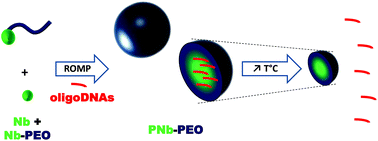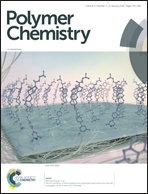Thermosensitive polynorbornene poly(ethylene oxide) nanoparticles loaded with oligoDNAs: an innovative approach for acting on cancer-associated pain†
Abstract
DNA oligonucleotides (oligoDNAs) have been recently identified as a novel class of therapeutic tools for acting on the cancer-associated pain. Polymeric nanoparticles (NPs) are interesting entities to entrap and protect such molecules to allow their carriage through the bloodstream to the spinal cord. In this contribution, original thermosensitive NPs are designed to deliver oligoDNAs only at a temperature close to the physiological one. These core/shell NPs, having a hydrophobic polynorbornene (PNb) core and a hydrophilic poly(ethylene oxide) (PEO) shell, have been synthesized in the presence of oligoDNA molecules. The use of the PEO shell allows the furtivity of the NPs and enhances the circulation half-life of the NPs whereas an increase in the temperature higher than the glass temperature (Tg) of the PNb (close to 37 °C) involves an increase in the mobility of the hydrophobic polymer chains which implies a contraction of the NP core and the release of the oligoDNA molecules. In this paper the influence of the NP chemistry (presence of a crosslinker; functionalization of the NPs with glucosamine molecule) on both the entrapping rates and the thermosensitive release kinetics of the oligoDNA molecules is presented. The ability of the NPs to be internalized inside neuronal cells has also been shown by using Rhodamine functionalized NPs.



 Please wait while we load your content...
Please wait while we load your content...